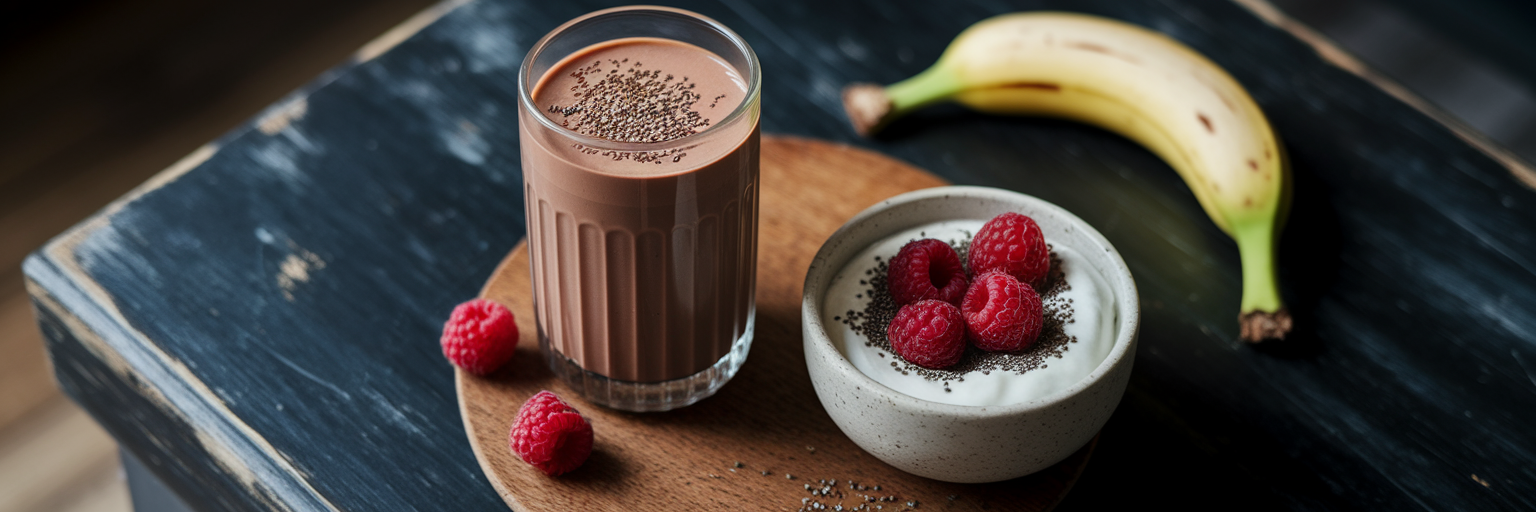The Plant-Based Nighttime Nutrition Ritual
For decades, we have been told that eating before bed is a direct path to weight gain. This outdated advice overlooks a crucial detail: what you eat matters far more than when you eat it. Consuming vegan protein before bed is not a late-night indulgence; it is a strategic nutritional practice designed to enhance the body's natural repair processes while you sleep. Think of it as providing your muscles with the necessary tools for overnight construction work.
For anyone committed to a plant-based lifestyle, meeting daily protein requirements for fitness goals can be a challenge. A planned nighttime snack becomes a key opportunity to close that nutritional gap. It ensures your body has a steady supply of amino acids to rebuild and strengthen muscle tissue that was broken down during exercise. This isn't just about preventing hunger. It's about actively supporting your body's recovery cycle. When you explore different approaches to fitness, you'll find that timing your nutrition is a common theme, and we share more insights on this in our educational content.
This simple habit raises important questions. How exactly does the body utilize this protein during sleep? What are the tangible benefits for muscle repair and reducing soreness? And can this ritual genuinely lead to a better night's rest? Let's explore the science and practical applications of this powerful recovery tool.
The Science of Overnight Protein Absorption

To understand why a pre-sleep protein shake works, we need to look at what happens inside our bodies overnight. During deep sleep, the rate of Muscle Protein Synthesis (MPS), the process of building new muscle tissue, naturally increases. This is your body’s prime time for repair. However, this process requires fuel in the form of amino acids. Without a readily available supply, your body can't take full advantage of this anabolic window.
Providing your system with protein before rest gives it the exact resources needed for this crucial nighttime muscle repair. A common concern is whether the body can even digest and use protein effectively while sleeping. Research has put this worry to rest. A foundational study highlighted by the National Center for Biotechnology Information (NCBI) confirms that protein ingested immediately before sleep is effectively digested and its amino acids are absorbed into the bloodstream, making them available to stimulate muscle growth.
The type of protein also plays a role. Plant protein blends, particularly those combining sources like pea and rice, offer a more sustained release of amino acids compared to some faster-absorbing proteins. This steady delivery helps maintain a positive nitrogen balance throughout the night, a state where muscle synthesis outpaces muscle breakdown. This prevents your body from entering a catabolic (breakdown) state, ensuring the hard work from your training session translates into real gains. Understanding these differences is key, and you can learn more about choosing the right protein for your goals on our blog.
Boosting Muscle Recovery and Athletic Performance
With the science of absorption established, we can focus on the tangible outcomes for your fitness journey. Consistent pre-sleep protein intake directly translates into better recovery and enhanced athletic performance. One of the most immediate benefits is a reduction in Delayed Onset Muscle Soreness (DOMS). We all know that feeling of stiffness a day or two after a tough workout. By providing the amino acids needed to repair exercise-induced micro-tears in muscle fibers, you can lessen that soreness and get back to training sooner.
This practice is especially effective because it works in synergy with your body's natural rhythms. During deep sleep, your body releases its peak amount of human growth hormone (HGH), a powerful hormone that amplifies anabolic processes. When HGH levels are high and amino acids are readily available, the conditions for muscle repair and growth are optimal. This makes plant based protein for recovery a highly efficient strategy.
This isn't just a short-term fix for soreness. It's a long-term approach for cumulative gains. By consistently supporting your body's overnight recovery, you create an environment for continuous improvement. This is also where other supplements can complement your routine, as discussed in our article on the effectiveness of creatine.
Key Long-Term Performance Benefits:
- Reduced Muscle Soreness: Speeds up the repair of muscle fibers, allowing for more consistent training.
- Enhanced Strength Gains: Provides the building blocks needed to adapt and grow stronger from workouts.
- Improved Muscle Mass: Contributes to a net positive protein balance overnight, supporting lean muscle growth over time.
- Better Overall Adaptation: Helps the body recover more completely, leading to improved performance in subsequent training sessions.
Practical Vegan Protein Choices for Bedtime

Making nighttime protein a part of your routine should be simple and enjoyable. The goal is to provide your body with 20-30 grams of high-quality protein about 30-60 minutes before bed. This timing allows for initial digestion without disrupting your sleep. For the best vegan bedtime snacks, focus on options that are easy to digest and feature a complete amino acid profile, which is crucial for MPS. A blend of pea and rice protein is an excellent choice because it supplies all the essential amino acids your body needs for repair.
A simple protein shake is often the most efficient option. The key to sticking with this habit is finding a protein powder that you genuinely enjoy. A smooth, non-chalky texture makes the experience feel like a treat rather than a chore. For instance, a scoop of our chocolate vegan protein mixed with plant-based milk creates a satisfying and effective recovery drink. This calming ritual can also signal to your body that it's time to wind down, which may help improve sleep with protein by creating a consistent and relaxing routine.
Beyond shakes, there are other great whole-food options. The key is to balance protein content with digestibility. You can find more inspiration with these easy vegan protein recipes that work well for any time of day. To help you choose, here is a comparison of popular bedtime snacks.
Comparing Vegan Bedtime Snack Options
| Snack Option | Approx. Protein | Key Benefit | Best For |
|---|---|---|---|
| Vegan Protein Shake | 25-30g | High protein, fast & easy preparation | Maximizing post-workout recovery |
| Soy Yogurt with Seeds/Nuts | 15-20g | Probiotics and sustained energy | Supporting gut health and satiety |
| Banana with Protein-Infused Peanut Butter | 10-15g | Whole foods, rich in potassium | A lighter, natural carbohydrate option |
| Chia Seed Pudding (made with protein milk) | 15-20g | High in fiber and omega-3s | A make-ahead, digestive-friendly choice |
Note: Protein content is an estimate and can vary based on specific products and portion sizes. These options are chosen for their balance of protein, digestibility, and ease of preparation for a nighttime routine.



